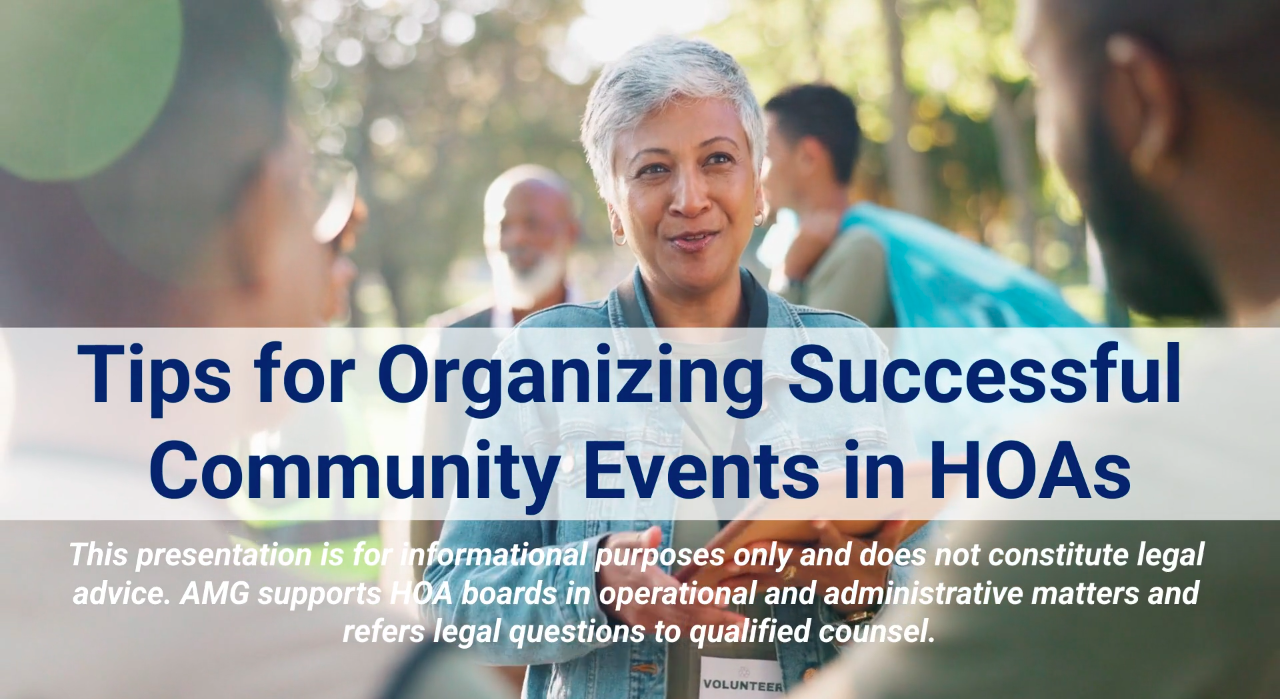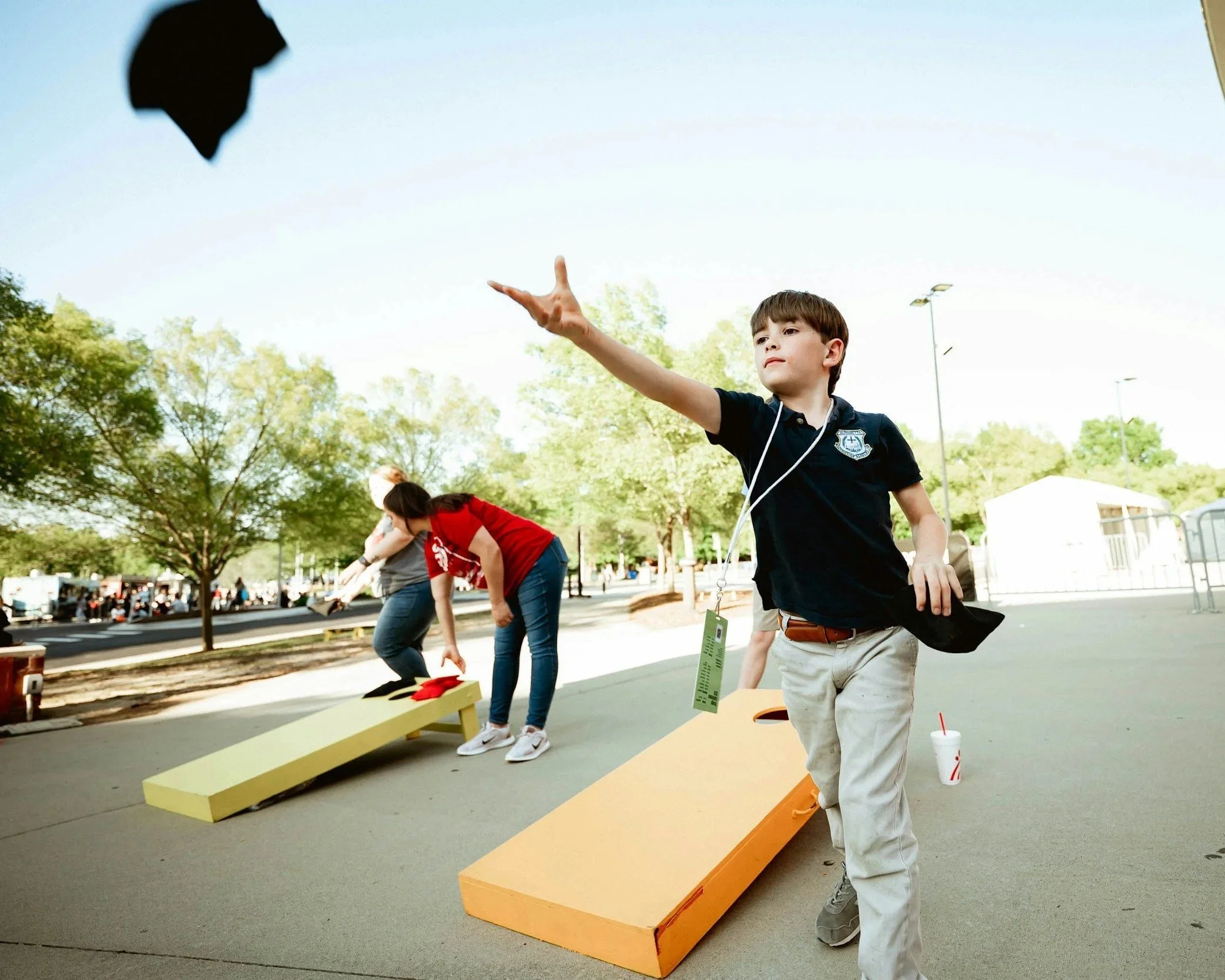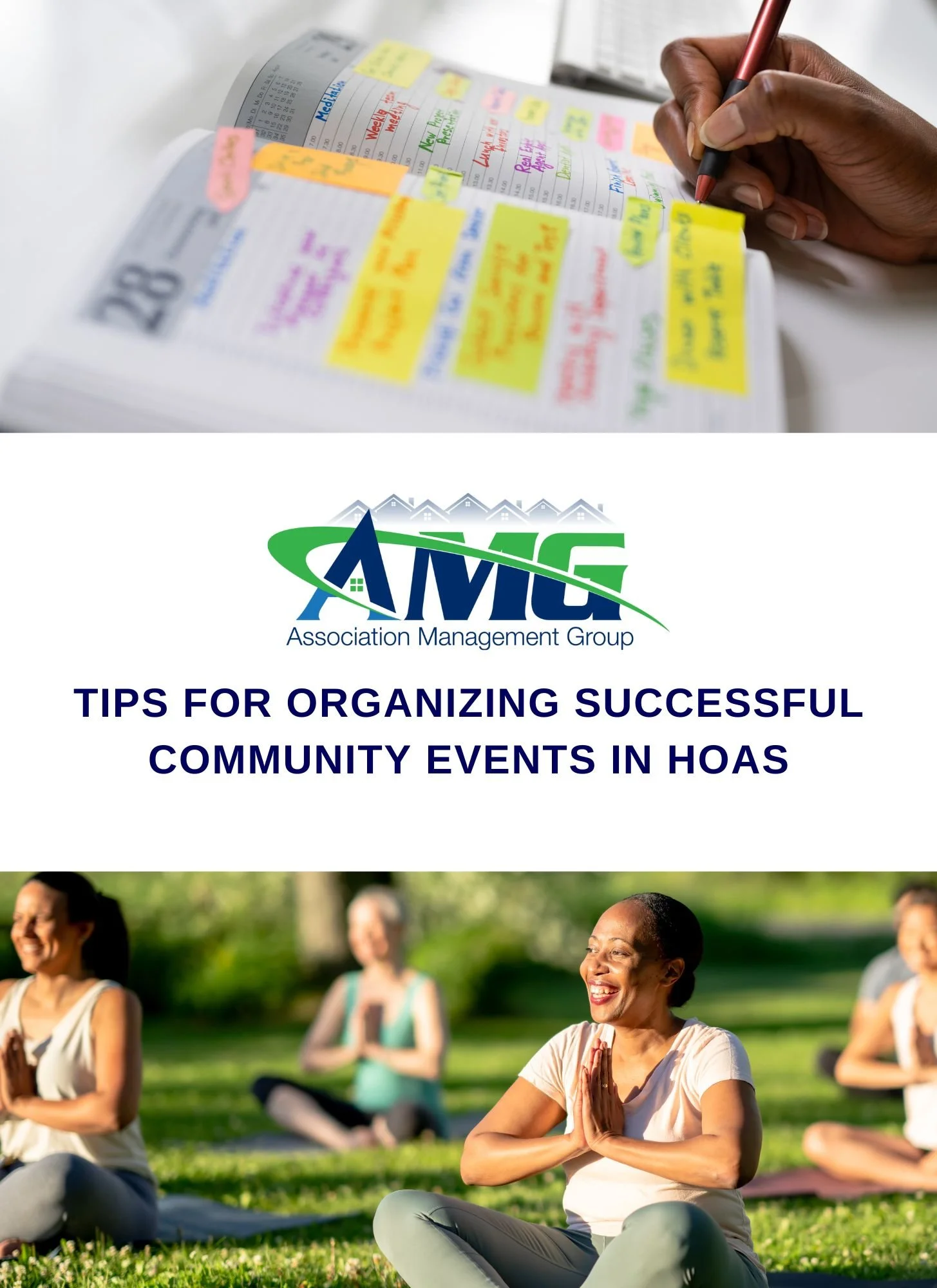Tips for Organizing Successful Community Events in HOAs
Disclaimer: AMG provides operational support to HOA boards but does not offer legal advice. Any legal concerns should be directed to qualified legal counsel. This content is for informational purposes only.
Community events are the heartbeat of a strong HOA. They build trust, encourage participation, and create a sense of pride that lasts far beyond a single afternoon. Whether it’s a picnic, volunteer day, or holiday celebration, a successful event starts with thoughtful planning and follow-through.
At Association Management Group (AMG), we’ve helped HOA boards across the Carolinas and beyond plan events that bring people closer together. Here’s how your association can create events that build connection, inclusion, and long-term engagement.
Tip 1: Define the Purpose and Plan Smart
Before booking a venue or hiring entertainment, pause and ask: Why are we doing this?
Clarify your purpose.
Are you welcoming new homeowners?
Recruiting volunteers or building committee involvement?
Raising funds or simply strengthening relationships?
A clear purpose determines every other decision—from your budget and activities to your communication style.
Create a realistic plan.
List essential components: venue, food, entertainment, marketing, and supplies. Assign roles so nothing falls through the cracks. A shared online checklist or spreadsheet keeps everyone aligned.
Budget wisely.
Estimate all costs, including a 10–15 percent contingency for unexpected needs. Keep receipts and track spending transparently—it builds confidence and accountability.
A clear plan sets the foundation for every great community event.
Tip 2: Choose the Right Time, Place & Partners
Timing and location can make or break participation.
Choose the right date and time.
Avoid conflicts with school or city events.
Consider who you’re trying to reach—families prefer weekends, retirees may enjoy daytime gatherings.
Communicate early—six weeks’ notice is ideal.
Select the perfect venue.
Walk the space ahead of time and check:
Lighting and restrooms
Accessibility and parking
Power outlets, seating, and shade
Safety and cleanup logistics
Example:
One HOA hosted a “Movie Night Under the Stars” but forgot to test the outdoor lighting. After adding a site walkthrough to their checklist, the next event went flawlessly—and attendance increased 40 percent.
Partner with trusted vendors.
Confirm contracts in writing and collect Certificates of Insurance (COIs) for your records.
Note: AMG assists HOA boards by collecting vendor COIs for recordkeeping but does not verify or validate insurance coverage. Associations should confirm policy details with their own professionals.
A little diligence upfront ensures everyone can simply enjoy the day.
Tip 3: Create Activities That Build Connection
Great events engage people—they don’t just entertain them.
Design for participation.
Families: scavenger hunts, bounce houses, outdoor movies
Adults: trivia, tastings, or live music
Seniors: garden walks, afternoon teas, or craft workshops
Pet lovers: dog parades or “yappy hours”
Mix fun with purpose.
Tie activities to your goal. If you want more volunteers, include a “Community Corner” table for committee sign-ups.
Example:
A South Carolina HOA added “Minute-to-Win-It” games to its annual picnic. Laughter filled the park—and three residents joined committees by day’s end.
Encourage inclusivity.
Offer translated materials if needed, provide accessible seating, and rotate event times so everyone can participate.
When people interact casually, they form the relationships that make a neighborhood feel like home.
Tip 4: Communicate, Engage & Follow Up
Even the best-planned event can fall flat without clear, consistent communication.
Promote early and often.
6–8 weeks ahead: Send a save-the-date.
4 weeks ahead: Provide details and RSVP link.
1 week prior: Reminder with parking info or “what to bring.”
Post-event: Share highlights and thank participants.
Use multiple channels—email, social posts, flyers, and text alerts—to reach everyone.
Engage volunteers and residents.
Recruit help early and publicly thank everyone who participates. Recognition builds ownership and pride.
Collect feedback.
After the event, send a short survey or invite informal comments.
Example:
An HOA discovered through surveys that residents preferred earlier start times. Adjusting the schedule improved turnout by 35 percent the next year.
Good communication is more than marketing—it’s relationship building.
Tip 5: Build a Culture of Connection Year-Round
A single great event is valuable. A culture of engagement is transformative.
Keep momentum going.
Plan smaller gatherings between big events
Highlight residents’ achievements in newsletters or social media.
Celebrate milestones—anniversaries, improvements, or awards.
Make engagement part of the HOA’s DNA.
Predictable communication, gratitude, and inclusive planning foster long-term cooperation.
AMG partners with boards to provide structure—vendor coordination, communication platforms, and administrative support—so your volunteers can focus on people, not paperwork.
Connection Is the Goal
Hosting a great event doesn’t require perfection—it requires intention.
When HOA boards plan thoughtfully, communicate clearly, and keep residents engaged beyond the event itself, they create communities that feel welcoming and proud.
At AMG, we believe every HOA has the potential to become more than well-managed—it can become well-connected.
About the Author
Paul Mengert, CEO of Association Management Group, has spent over 40 years helping community associations operate more effectively, transparently, and fairly. He has personally served on HOA and condo boards in both North and South Carolina, bringing a firsthand understanding of the challenges board members face.
Paul is a nationally recognized educator who has trained managers and board members across the Carolinas and in dozens of other states. He teaches decision-making and governance strategies and is a frequent guest lecturer at Wake Forest University School of Law. Named Educator of the Year by the Community Associations Institute, Paul is known for combining deep experience with a practical, solutions-first approach that boards trust. Learn more at AMGworld.com.
-
Speaker: Paul Mengert, CEO, Association Management Group
Disclaimer
This presentation is for informational purposes only and does not constitute legal advice. AMG supports HOA boards in operational and administrative matters and refers legal questions to qualified counsel.
Introduction
Hi, I’m Paul Mengert, CEO of Association Management Group.
Today, we’re talking about one of the most rewarding ways to strengthen your HOA — organizing community events that bring neighbors together.When residents come together, a neighborhood becomes more than a collection of homes — it becomes a community. Events help neighbors connect on a personal level. They build trust, increase volunteerism, and even make meetings more productive because people already know one another.
Here are five practical tips to help your HOA plan events that truly make a difference.
Tip 1: Define the Purpose and Plan Smart
Every successful event starts with one clear question: Why are we doing this?
Are you welcoming new homeowners, raising funds, or simply building connection? When your purpose is clear, the details fall into place.
Build a simple plan — set a budget, assign responsibilities, and communicate expectations early.
For example, one HOA turned its routine “Spring Social” into a New Neighbor Picnic. Color-coded nametags helped break the ice, and by the end of the day, several new volunteers had joined committees.
A clear purpose and thoughtful plan keep everyone aligned — and stress low.
Tip 2: Choose the Right Time, Place, and Partners
Timing and setting can make or break participation.
Pick a date that works best for your residents. Avoid school or holiday conflicts, and announce it early. Walk the site before the big day — check lighting, parking, restrooms, and accessibility.
One HOA hosted an outdoor movie night but forgot to test the lights. A simple walkthrough beforehand would have saved them from improvising with flashlights. They added it to their checklist, and the next event went perfectly.
And remember — always collect vendor Certificates of Insurance (COIs) for your records. AMG helps boards facilitate this process and stay organized.
Tip 3: Create Activities That Build Connection
The best events invite participation, not just attendance.
Think about your residents:
Families enjoy scavenger hunts or bounce houses.
Adults may prefer trivia or food trucks.
Pet owners love friendly contests or “yappy hours.”
When residents laugh together, they form relationships that make the entire community stronger.
Tip 4: Communicate, Engage, and Follow Up
Even a great plan can fall short without clear communication.
Start early — send a save-the-date six to eight weeks ahead, event details at four weeks, and reminders the week before. Use email, flyers, your HOA portal, and text alerts so no one misses the invitation.
During the event, thank volunteers and personally welcome guests.
Afterward, share photos, post highlights, and ask for quick feedback. One community discovered through feedback that residents preferred earlier start times — a small change that doubled attendance the following year.
Good communication turns one-time participants into long-term supporters.
Tip 5: Build a Culture of Connection Year-Round
A single event can spark community spirit — but consistency keeps it alive.
Host smaller gatherings between big events: coffee mornings, walking groups, or “Porch Nights.”
Recognize volunteers publicly.
Highlight residents’ achievements in newsletters.AMG supports boards with the structure that keeps this momentum going — providing tools for communication, scheduling, and vendor coordination — so you can focus on people, not paperwork.
Closing
Successful events aren’t about perfection — they’re about participation.
When your board defines clear goals, communicates openly, and follows through, you create more than an event — you create belonging.
At AMG, we believe strong communities aren’t just managed — they’re connected.
Thanks for watching, and to learn more about how AMG supports HOA boards in building engaged, thriving neighborhoods, visit www.AMGworld.com
To view our informational pamphlet from this webinar. Click here or on the image.
AMG facilitates community association management and provides educational resources. AMG does not provide legal or financial advice. For questions involving statutes, insurance coverage, or disputes, please consult licensed professionals.
















